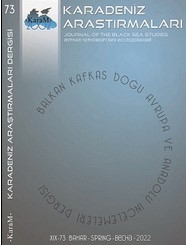KOREA IN THE OCCUPATION PROCESS AND ABDÜRREŞİD İBRAHİM
KOREA IN THE OCCUPATION PROCESS AND ABDÜRREŞİD İBRAHİM
Author(s): Hasan BarlakSubject(s): Christian Theology and Religion, Political history, Social history, Pre-WW I & WW I (1900 -1919)
Published by: Karadeniz Araştırmaları Merkezi
Keywords: Korea; Abdürreşid İbrahim; Japan; Colonial; Independence;
Summary/Abstract: The early 20th century meant the beginning of the Japanese colonial era for Korea. Turkish/Tatar activist Abdürreşid İbrahim went to Korea from Japan just before the annexation. Upon visiting a number of Korean cities, towns, and villages, he felt an affinity towards the Koreans. He followed its religious and political issues closely. The intense Christian missionary activities there disturbed him deeply. Likewise, he was upset that he himself could not deliver them the message of Islam. During his brief time in Korea, he tried to talk with as many locals as possible in order to learn what they thought about their Japanese administration. However, since almost every dialogue took place through Japanese interpreters, he was not sure that he was able to learn the truth. He was well aware that Koreans were a noble nation, and yet he felt uneasy when he saw that the Koreans themselves felt intimidated by the Japanese occupation. In his view, if Korea was to be a colony, it was better that it be ruled by Japan rather than other powers; nevertheless, he was unwilling to accept it that it was under anyone’s control at all. He, thus took a stance that was in favor of Korean independence, and urged those Koreans he talked with to struggle for that cause.
Journal: Karadeniz Araştırmaları
- Issue Year: 2022
- Issue No: 73
- Page Range: 93-109
- Page Count: 17
- Language: English

